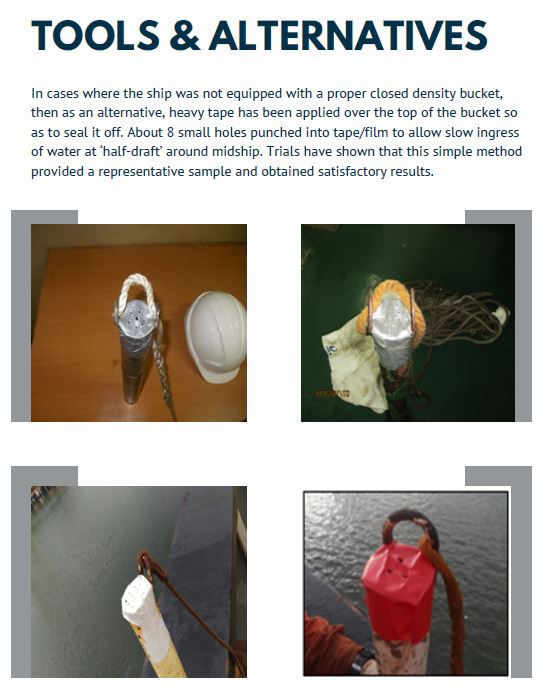Draft Survey and Water Density
- Admin

- Jun 7, 2025
- 2 min read
Updated: Jun 10, 2025
🌊 Draft Survey and Water Density – Don’t Lose Cargo on Paper
One small mistake during a draft survey can lead to a big loss — not in reality, but on paper. And often, the issue comes from something simple: how you take the water sample for checking density.
Many ships still use the wrong type of bucket when checking water density — especially in brackish water ports. This post explains the problem and how to avoid it.
⚖️ Why Draft Survey and Water Density Matters
Water density directly affects the draft of the vessel and the calculated cargo quantity. If the wrong (too low) density is used during draft survey, your ship may appear to carry less cargo than it actually does — meaning lost freight earnings.
Each 0.001 difference in density can lead to a difference of 1 TPC (Ton per Centimeter) for many bulkers. That’s easily 50–300 MT lost on paper!
❌ The Common Mistake – Open Top Bucket
Most crews use open-top buckets, which collect water only from the surface, even if you try to lower them deeper. Why is this a problem?
Surface water in brackish ports is less dense
Deeper layers (half-draft or midship) are more saline and denser
Using surface water underestimates actual density
🧪 Result: Your calculated cargo weight is too low, and charterers won’t pay for what’s “missing.”
✅ The Solution – Closed Top Buckets
Closed-top density buckets allow slow water ingress and collect water from the correct depth.
Even a DIY fix (sealing the top with tape and punching a few holes) has proven effective when proper buckets are not available.
📉 Real Data From Brackish Ports
In 249 surveys analyzed:
Average cargo lost on paper: 87 MT
Average lost freight: $1,600 per shipment
Total potential loss in one year: $2.5 million
This happened mainly in brackish water ports like river berths, estuaries, and tidal zones.
🧭 Sampling Best Practices
Always take water sample at half draft depth
Use closed bucket or a modified sealed bucket
Avoid using refractometers for draft surveys — they’re inaccurate due to temperature effect
Use proper hydrometers — preferably Zeal (UK) brand for accurate results
🛠 Tip for Crew: Quick Fix If No Closed Bucket
If your ship has no proper density bucket, you can use this method:
Seal the top of a normal bucket with heavy-duty tape
Punch 6–8 small holes for water to enter slowly
Lower to required depth and wait before pulling up
💬 Final Word
Draft survey and water density is not exact science — but precision matters.
Correct density sampling is easy, cheap, and gives fair results for your ship. Every MT counts. And every draft counts. Let’s stop losing cargo on paper because of surface water!



✅ This post is for general awareness. Always follow your company’s procedures and surveyor guidelines when conducting draft surveys.
👉 Log in to your Master Work Station account and leave a comment below. Help others by sharing your real-world experience and tips.

Comments